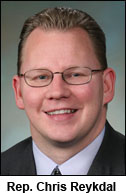OPINION
Hijacked Senate budget exposes differences in legislators’ values
It began like any other cut-off afternoon in Olympia complete with legislators, lobbyists, and staff scrambling to ensure that priority bills do, or do not, make their way to the floor for a vote.
Business as usual came to a halt when Sen. Don Benton (R-Vancouver) motioned that the Senate move to the infamous 9th order. Cue confusion, panic, and a mad scramble among Senators.
Within a matter of minutes it became clear what had happened. Three Democrats decided that a few of their personal priorities were worth holding a $30 billion budget hostage. What we’d see over the next several hours would include a marathon of procedural motions, strategic votes, passionate speeches, and a loss of trust between old friends.
Two hours into the coup, Gov. Chris Gregoire would address the media to deliver a stinging rebuke of the lack of transparency. Asking Senators to vote on a $30 billion budget without a single public hearing is wrong not only because it doesn’t let the public weigh in, but also because legislators don’t know what it means for their districts and their issues.
There is a reason you don’t write budgets in closed-door meetings and through a series of backroom deals. In the words of Sen. Tracey Eide (D-Federal Way), “I don’t know what the hell I’m voting for.”
Blindsided, the Democrats frantically dropped amendment after amendment onto the budget, seeking to defend their values and support programs vitally important to the people of Washington including basic education, family planning, environmental clean-up, and food stamps. Each amendment suffered the same fate: failing 25-24.
By midnight the debate on final passage was nearly complete. The differences between the Senate Democrats’ proposed budget and the new backroom budget were very clear:
- -$37 million from low-income housing
- -$4 million from crime victims
- -$30 million from disaster recovery
- -$12 million from children’s services
- -$14 million from food assistance (food stamps)
- -$150 million from low-income families and childcare
- -$20 million from drug treatment
- -$85 million from the disabled
- -$9 million from the homeless with substance abuse issues
- -$6 million from family planning
- -$21 million from environmental protection and public health
- -$36 million from clean up toxic sites
- -$8 million from fish hatcheries and marine enforcement
- -$15 from K-12 programs including Running Start and Navigation 101
- -$30 million from education reform (including national board bonuses)
- -$41 million from higher education
- -$206 million from public employee health insurance and pensions
- +$7 million in mental health (the only improvement)
That budget passed, you guessed it, 25-24. A philosophical majority successfully hijacked the most important piece of legislation we’ll pass this year, and the difference in values is clear. If you ever wondered if a bicameral legislature and a Governor with veto power was truly necessary, let this incident show you why the checks and balances inherent in our democracy are, while at times frustrating, essential.
And it didn’t end when the budget passed.
No, by 1 a.m. our state’s pension system for public employees was on the chopping block. The “majority party” did more to dissuade young people from entering the public sector in five minutes then they’ve been able to do in the previous five decades.
And by 1:13 a.m. the majority moved to permanently rob liquor revenue from local governments.
And at 1:21 a.m. money was diverted out of the Public Works Trust Fund, starving the fund of future revenue necessary to maintain local infrastructure projects.
By 2:07 a.m. in the dark of the night while most people slept, it was over; for now.
Last week, a reporter asked me if I was willing to leverage my vote on the House Democrats’ version of the budget in order to move my priority bill. The answer was unequivocal: no.
Here’s why: Washington’s future is too important to hold hostage over one or two issues of personal importance. On Friday night, we saw what happened when three Senators came up with a different answer to that question.
Chris Reykdal is a Washington State Representative, serving the 22nd Legislative District, which includes Olympia, Tumwater and Lacey.






